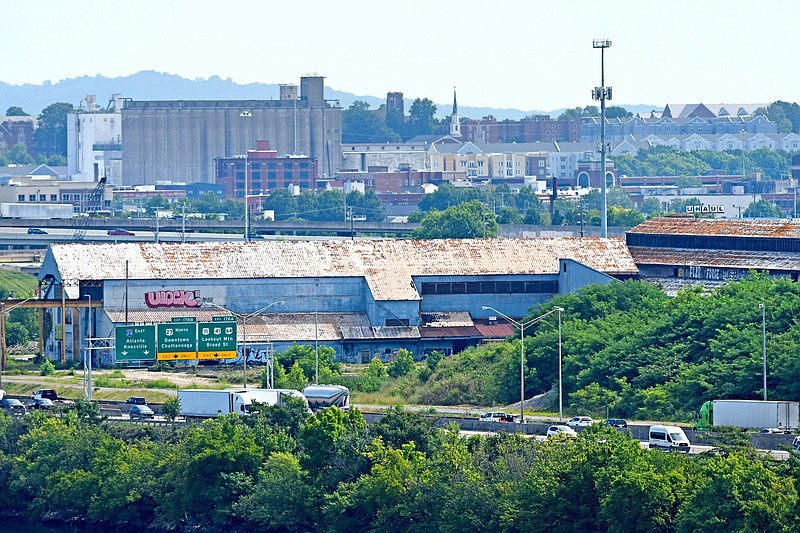A Chattanooga panel on Monday unanimously agreed to send a financing plan for a new multiuse stadium to the City Council for its consideration, pushing the proposed project closer to reality.
But advocates for the nearly $80 million stadium and a special tax district to help fund the Chattanooga Lookouts facility on the rundown former U.S. Pipe/Wheland Foundry site were peppered with questions about the project at a Chattanooga Industrial Development Board meeting.
Jimmy Rodgers, the panel's chairman, asked at the meeting what happens if the Lookouts minor league baseball team files for bankruptcy and can't make the $1 million or more annual lease payment over 30 years that's helping finance the stadium that would go between Interstate 24 and Broad Street.
Brent Goldberg, the city's chief financial officer, said the Lookouts group headed by managing owner and chief executive Jason Freier is "one of the most well-regarded ownership groups in minor league baseball."
"It would have to be catastrophic," he said.
(READ MORE: Chattanooga Lookouts owner calls Wamp claims of extortion 'absurd')
Rodgers said that while he wasn't suggesting any problem with the Lookouts, much bigger companies have filed for bankruptcy.
"What I'm hearing is that there's no safety net for the city," he said.
Goldberg said he's sure the city, through a Chattanooga-Hamilton County sports authority that would own the stadium, would be "a prioritized creditor."
Freier said at the 2 1/2-hour meeting that drew more than 100 people - many of whom were Lookouts supporters - that minor league baseball isn't a high-return business, nor is it high risk.
Also, Major League Baseball requires the team to submit documentation that shows the Lookouts' financial health, he said. In addition, Freier said, the Lookouts ownership group includes 18 local people.
New property tax revenue from a special tax district, the Lookouts' lease payments, sales taxes, parking revenues and $1.4 million each from the city and county will pay for debt service on 30-year bonds issued for the project. Through tax-increment financing, such districts are designed to spur development in areas often before activity would typically take place.
The plan shown to the board includes creating a tax district of about 470 acres around the stadium to pay for 58% of the project. The district includes not just the 120 acres of developable foundry property, but the South Broad area around it. Also included are a number of tracts south of Chattanooga Creek, including a site for a proposed greenway connecting to Alton Park.
City and county officials have said they initially expect $350 million in new development in the tax district over the 30-year period, but Hamilton County Mayor Jim Coppinger and Chattanooga Mayor Tim Kelly have said $1 billion or more is anticipated.
Helen Burns Sharp, founder of the citizens group Accountability for Taxpayer Money, raised several questions at the meeting, including about environmental remediation, who is responsible for cost overruns on the stadium and public infrastructure needs.
Sharp said it appears if tax-increment financing revenue exceeds debt service, the sports authority can set up a reserve fund to pay "the cost of or debt service related to public improvements in the plan area," including the proposed greenway.
"Identifying infrastructure as a generic project in the plan area opens up a bottomless spending pit and the opportunity for crony capitalism," Sharp said. "If our elected officials want to spend TIF funds on infrastructure, could they be specific on what improvements, where?"
Sharp added that she believes the project has the potential to be "a game changer for Chattanooga."
Jermaine Freeman, senior adviser for economic opportunity for Kelly, said the stadium is the first piece of a broader revitalization effort.
He said people who live in the area want to see minority participation in the project, mixed-income housing and attention to traffic in the South Broad District.
Geoffrey Meldahl of Chattanoogans in Action for Love, Equality and Benevolence told the board that a community benefits agreement has been discussed with city staff. He mentioned opportunities relating to affordable housing, minority contracting and employment programs.
"These things don't happen without an agreement," he said.
Goldberg said public/private financing isn't new to Chattanooga, citing Finley Stadium, which opened in 1997. He said he doesn't expect a negative impact to Finley, which is nearby on downtown's Southside.
He said the University of Tennessee at Chattanooga football team and the Chattanooga FC soccer team, of which Kelly is a co-founder, would remain at Finley.
The county's Industrial Development Board approved moving the stadium financing plan onto the County Commission in July for its consideration.
Contact Mike Pare at mpare@timesfreepress.com or 423-757-6318. Follow him on Twitter @MikePareTFP.
